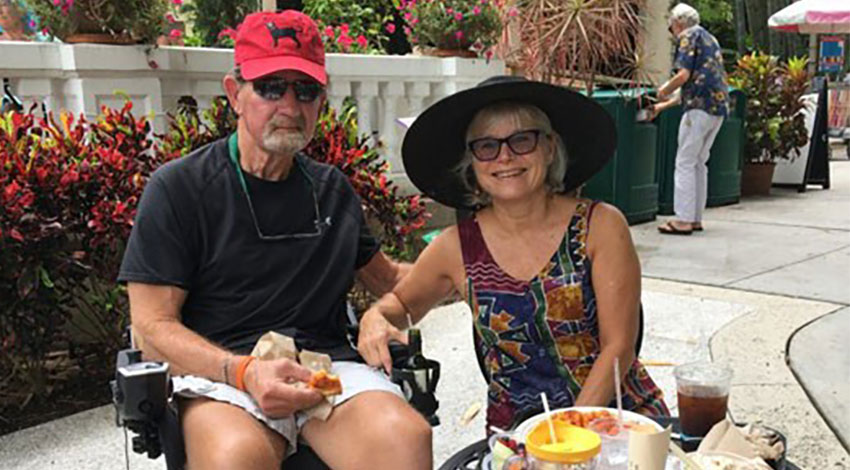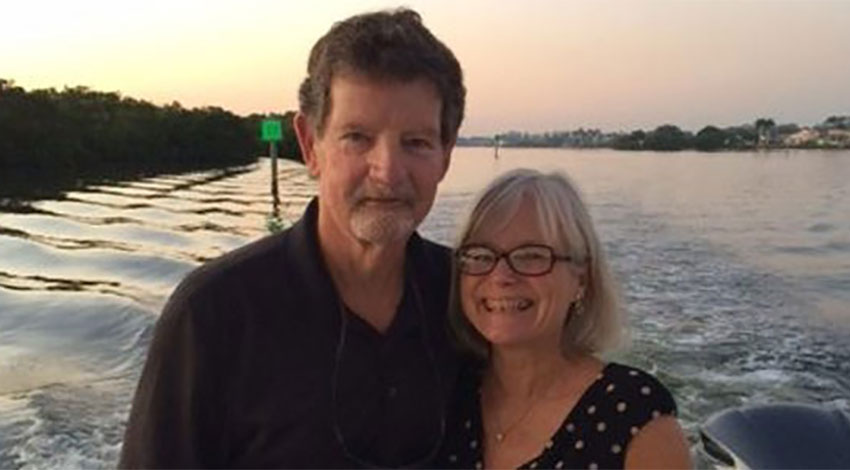5 Pieces of Advice for Caregivers From a Former Caregiver
In 2012, Nancy Hardaway received some of the hardest news anyone can receive when she learned that her husband was being diagnosed with Multiple System Atrophy — a rare, progressive, terminal neurodegenerative disease with no treatment and no cure. Without hesitation, she began the complicated and harrowing process of becoming a full-time family caregiver.
Throughout her 11-year journey as a full-time caregiver, Nancy learned countless lessons, like how to avoid caregiver burnout and how to accept the help of others. Read on for her caregiver tips for those caring for elderly parents or ill spouses.

1. Stay in the Present
Because my husband’s disease was progressive, we were always facing a future that was more difficult than the present. Still, we had a choice. 1) We could dwell in the past and resent the universe for all of the things we could no longer do. 2) We could look toward the future with a feeling of dread. 3) We could live in the present and make the most of it. It wasn’t always easy. In fact, it wasn’t ever easy. But I woke up each day and told myself that the only day that mattered was today. I had to actively choose to pay attention to the present. All I had to do was find ways to make that day a good day ... not just for him, but for both of us.
2. Acknowledge Caregiving as a Burden
Someone visiting my husband and me once said to him, “You should know that you are not a burden.” As a caregiver, you never want to say that your family member is a burden. The word brings with it negative connotations. But the word “burden” is defined as “something that is carried; a load” or “a duty or responsibility.” In nearly every case, that’s exactly what caregiving is. Caregiving for a spouse or elderly parent may start gradually but can become a full-time job. To say that caregiving “isn’t a burden” can minimize the value of all that the caregiver is doing — the heavy weight he or she is carrying.
One tip for caregivers is to acknowledge, at least to yourself, how extraordinarily hard a journey that caregiving can be, often with no end in sight. This can help remind you how strong you are and help you understand why you’re exhausted. Recognizing your burden offers permission for you to look for support — to strengthen yourself and lighten the load. Road Scholar’s grants for caregivers are one way to do that. By offering Caregiver Grants, Road Scholar acknowledges and honors both the burden and the value of caregiving.
3. Learn to Identify (and Avoid) Caregiver Burnout
Because caregiving is a burden, both emotionally and physically, I often found myself getting depleted. I was constantly in “fight” mode — fighting the symptoms, fighting our helplessness against the disease or fighting the healthcare system for appropriate care. My energy and resilience would burn out, along with my optimism and hope. I worked at building myself up as much as I could — keeping up with doctor’s appointments, finding ways to get exercise that wouldn’t take too long or take me too far from him, or staying in touch with my interests through online classes. But caregiver burnout is inevitable. The longer you are a caregiver, the more depleted you get. I finally knew I needed a break.
I found out about the Road Scholar Caregiver Grants through a friend, but by then my husband couldn’t be alone for long. But I was able to arrange for a weekend away, and it made such a difference. If you can get away, go. Go even if you think you don’t need to, so you can prevent caregiver burnout and care for yourself, too. Take advantage of Road Scholar’s grants for caregivers if you can. Accept opportunities for respite — they can help you return to your duties refreshed, so you can be the best full-time caregiver you can be.

4. Be Vulnerable and Accept Help
My husband and I were always open about his illness. That willingness to be vulnerable seemed to invite offers for support. At first it was hard to accept help, for both of us. I figured if I “could” do it, I “should” do it. But, as things progressed, I began to recognize oncoming depletion. I realized that I couldn’t handle all of life’s daily responsibilities plus all the caregiving, too.
As I shared my challenges with friends, they helped me realize how much support I was refusing. So, I started saying yes to everything: food, rides, social visits and repairs. One of the best tips for caregivers I can give is: don’t be afraid to be open up about the difficulties of caregiving, and accept any help that is offered. What you’ll come to realize is that you’re giving friends and family members a gift by allowing them to help carry the burden.
5. Keep Your “Life-Space” as Big as Possible
As time went on, I could feel my life closing in. I came across the term “life-space” in the book "Elderhood," by Louise Aronson, and it resonated so much with me. Our lives were shrinking, fitting into a smaller and smaller space. We saw fewer people, traveled shorter distances, went fewer places. As our life-space decreased, our focus decreased, until all we could see was the disease.
So I went out of my way to increase our life-space any way I could. We had loved to travel, so I found shorter trips closer to home. We loved to entertain, so rather than hosting dinners, we invited friends over for cocktails. When he couldn’t leave the house for more than a few hours, I looked for easy places we could go in his wheelchair, like a fishing pier where he could be on the water.
Now that I’m alone, I’ve been exploring new ways to expand my life-space. That’s when I discovered that the Caregiver Grant eligibility extends for two years after caregiving ends. Road Scholar programs offer the perfect opportunity to travel alone but not by myself. I applied and am excited and grateful that the grant is allowing me to look forward to expanding my life-space all the way to Santa Fe.
Want to learn more?
Find out how you can apply as a family caregiver, or learn how you can give to support a grant.
Learn more about Road Scholar’s Caregiver Grants →
About the AuthorNancy Hardaway had careers in education, real estate sales and development, banking, nonprofit and leadership training before becoming a family caregiver for 11 years for her aging mother, her disabled sister and her ill husband. In her caregiving blog, The Artful Caregiver, she has drawn on her talents for writing and art to help her understand her role as a caregiver and, now, in her difficult post-caregiving transition.
